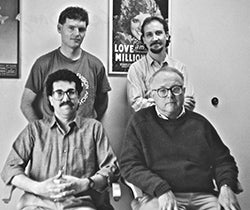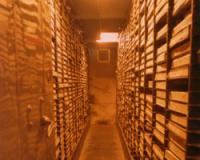It is with great sadness that I announce the passing of our friend and colleague, Charles Hopkins. He died on Saturday morning, July 27 from a number of complications. Charles was UCLA Film & Television Archive’s longest-serving employee, having started at the Archive as a student volunteer in 1971.
Charles was born on April 17, 1944 and graduated from Arroyo High School in El Monte. He studied History and the Classics, first at Mt. San Antonio College and later at UCLA.

After a stint at the Los Angeles County Sheriff’s Department, Charles began working with Bob Epstein, who was managing the Archive in its early days. Charles was officially hired as one of the Archive’s first full-time employees in 1974 and retired after 33 years of service in January 2007. Charles returned to the Archive shortly thereafter to help us out part-time and when I came to UCLA in December 2007, I shared an office with Charles at one of our Hollywood locations. Charles left Archive employment for good in June 2011.
Over his long career there was not a single job at the Archive Charles did not do at one point or another. In the early years, especially, Charles played a major role in virtually every Archive project. He programmed the Archive’s budding cinematheque offerings in the early 1970s, and as motion picture archivist from 1980 and 2002, Charles oversaw the incredible growth of UCLA Film & Television Archive’s vast collections, and under his guidance, the Archive became one of the largest moving image repositories in the world. Negotiating acquisitions, supervising inventory, and maintaining relationships with donors and depositors, Charles became somewhat of a legend in the field. Charles also arranged loans from our collections to other institutions and became an important liaison with one of our most important donors, Mr. David W. Packard, who had opened his own movie theatre for classic Hollywood films in Palo Alto.

I remember when I was at George Eastman House in the 1980s that I was usually told to contact Charles if I couldn’t find a rare print, and indeed Charles would usually know where or who owned the required print. I was extremely happy when in 2009, I was able to nominate Charles for an Association of Moving Image Archivists (AMIA) Award, and then had the great pleasure of presenting the Dan and Cathy Leab Award for distinguished service to him at the annual AMIA conference in St. Louis.
Charles’ programming activities, for which he wrote elegantly crafted texts, included creating the “Archives Treasures” concept, which has continued to be a feature of Archive programming to this day. For that program, he would schedule a newsreel, a short and/or cartoon, and a feature – all from the same era -- thus recreating the flavor of a movie palace program in Hollywood’s golden age. Charles also regularly wrote for the UCLA Festival of Preservation catalogs and his research on various historical topics was always impeccable and presented in a concise and always engaging form. Charles was a gifted writer, making him an invaluable member of the team when it came to writing grant proposals and other texts for public consumption. Indeed, once Charles handed over the reins of the day to day operations as archivist in 2002, he continued to serve as a senior administrator, responsible for special projects and planning.
Charles was above all a lover of cinema. We spent many hours in the office discussing either the newest films out on the town, Charles usually being up to date on such matters, or classic Hollywood films, where he was also extremely knowledgeable, always pointing me to sources that I was not aware of. After he finally retired, we kept Charles’ office space for him and he would volunteer for writing assignments. And even now, when he is gone, I’m loath to move his office; it seems almost sacrilegious to do so.
Charles will indeed be missed by all in the Archive; a tribute to him is being planned for the Fall.






 Mobile Navigation
Mobile Navigation


Comments